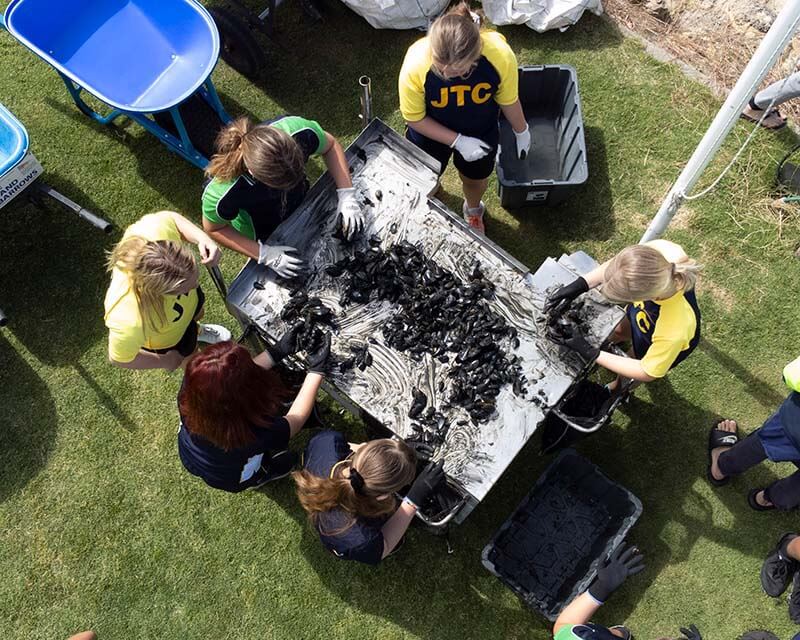December 12, 2022
Peel-Harvey community shows off its mussels to support the health of the estuary

About 300kg of Blue Mussels will soon be making a home on shellfish reefs restored in the Peel-Harvey Estuary in Western Australia thanks to the efforts and care of the local community who broke last year’s Mussel Muster record of 220kg.
Local school groups and community shellfish gardeners, who have been growing and monitoring the mussels from juveniles to adults in specially-designed baskets, harvested their efforts in the second annual Mussel Muster on Friday 2 December.
The volunteer gardeners brought the mussels they’ve tended to for the past few months to the celebratory event, where they were weighed ahead of being seeded onto reefs that The Nature Conservancy Australia (TNC) installed near Cox Bay in May this year.
The project, funded by The Alcoa Foundation and the Western Australian Government’s State NRM Program, aims to use the incredible filtering ability of shellfish and the habitat they create to help improve the health and biodiversity of the iconic Peel-Harvey Estuary.
It’s the second harvest of community-grown mussels with the first occurring in November 2021.
Dr Richard Campbell, TNC’s Oceans Project Coordinator for the Peel region, said approximately 50 resident gardeners and over 70 students from John Tonkin College and Coodanup College had been involved in growing the mussels since March over what had been a boom growing season.
“It is fantastic to see a whole community’s involvement around growing and caring for the mussels. We are so excited to see people of all walks of life, particularly the younger generations, get involved in projects which aim to improve the health of the estuary.
“The mussels started life in Cockburn Sound as wild spat settling on the lease of the aquaculture farm. Once they became juveniles, they were carefully put into specially-designed baskets, which were then tended to by our fantastic group of volunteers, either in the Mandurah Marina or off private jetties,” Dr Campbell said.
Alcoa Foundation Australian Lead, Suellen Jerrard, said it was exciting to see more mussels being seeded onto the shellfish reefs, contributing to the growth of the localised ecosystem and improving water quality.
“This project is proof that together every little bit can help. A big thanks to the residents and students who have tended to these mussels over the past nine-months and who can now see the real difference they will make.”
Dr Campbell said that over the past six months, monitoring of the reefs has shown good signs of ecological development, with high survival of shellfish and recruitment of fishes and algal communities. Further reef monitoring is planned for 2023.